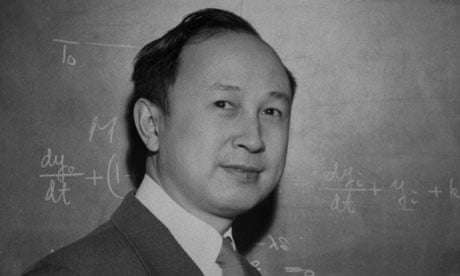Qian Xuesen, who has died aged 98, was one of the greatest Chinese scientists of the modern era, and a man widely regarded as the father of China's missile and space programme. His life spanned nearly a century, from the final few days of the Qing Dynasty, through the Republican period, from 1912 to 1949, and on to the 60th anniversary of the People's Republic of China (PRC). It also embodied the conflicts between the US and China, the two countries where he was to be based most of his life, and between which he was forced, finally, to choose.
Qian was the son of a government official, born in the city of Hangzhou in the coastal province of Zhejiang. He was educated at Shanghai Jiaotong University, and, in 1935, with the help of a scholarship, went first to the Massachusetts Institute of Technology (MIT) in the US, and then, a year later, to the California Institute of Technology (Caltech), where he was to be awarded his doctorate, and be based for the next two decades.
It was while in California, during the second world war, that his research concentrated on jet propulsion. With a number of other key US scientists, responding to the German V1 and V2 rockets, he devised a range of highly effective missiles, which proved crucial in the final stages of the war effort. Qian also participated in the Manhattan Project, which developed the first atomic bomb. As a result of this, he was made the first director of the Daniel and Florence Guggenheim Jet Propulsion Centre at Caltech in 1949.
In the same year, however, the communists won their final push to become rulers of the PRC, exiling the Nationalist leadership under Chiang Kai-shek, whom the US had largely supported, to the island of Taiwan. Qian was immediately suspected of being a communist sympathiser, with claims being made that his name had appeared on Communist party documents as early as the late 1930s. His application for US citizenship was subsequently denied, and he was detained after applying to leave America. One US official at the time called this the "stupidest thing this country ever did". In 1955, Qian was allowed to return to China.
The US's loss (one of Qian's colleagues in the 1930s had called Qian a scientist of genius) was China's gain, at a critical period in its development. Qian was immediately allowed to establish an Institute of Mechanics in Beijing, and to work within the state-established Chinese Academy of Science. His skills and knowledge were absolutely critical at a time when many of China's most talented scientists had refused to return home because of the political changes that had taken place there. A symbol of the respect and trust Qian enjoyed was his admission to the Communist party in 1958. He started work on what was to become the Dongfeng missile.
As a result both of his work, and of support from the Soviet Union (despite the fact that relations between these two countries had deteriorated badly in the late 1950s), China was able to test its own atomic bomb in 1963-64. A mere 15 years after its founding, it had joined the elite nuclear club. This was a seminal moment in the country's development.
Qian seems to have been largely unaffected by the tumult of the Cultural Revolution, from 1966, probably because he was working in such a key national strategic area. While chaos reigned in the rest of China, military and technical research continued unaffected.
In 2009, as China is preparing to build a space exploration launch pad on the island of Hainan, and has set itself the aim of getting a Chinese man on the moon in the next decade, Qian's contribution to China's space and missile programme should not be underestimated. Much of the technology behind the Shenzhou rockets, launched into space from the 1990s onwards to much national fanfare, can be traced back to research that Qian undertook. And much of that was based on what he had studied in the US during his 20 years there.
After his retirement in 1991, he maintained a low profile, despite being garlanded with awards. He is survived by his wife, the highly acclaimed Beijing opera singer Jiang Ying.
Qian Xuesen, rocket scientist, born 11 December 1911; died 31 October 2009
